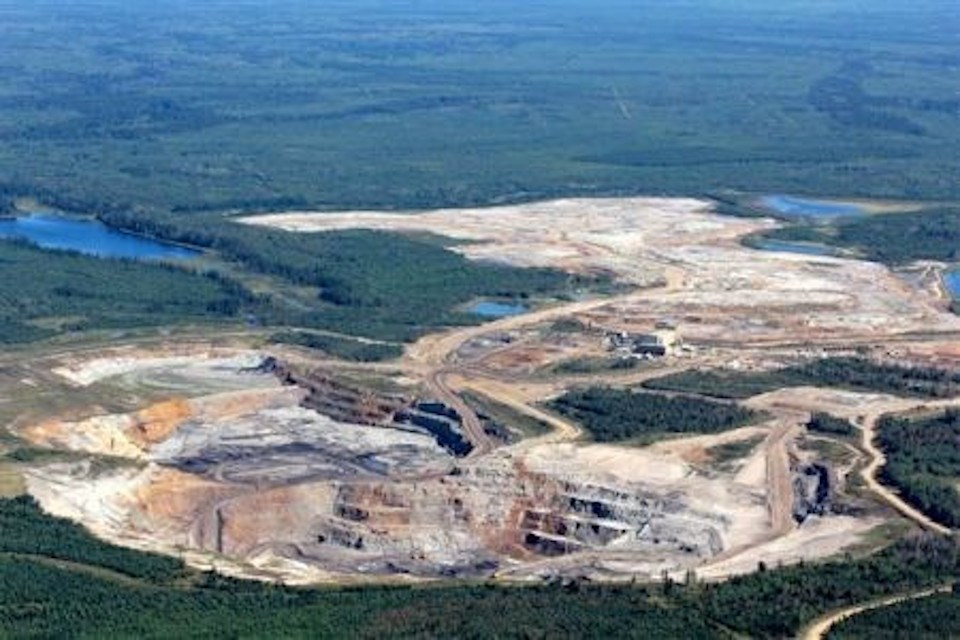A lithium exploration company wants to dig into a mine waste pile to recover valuable critical minerals that are used in fertilizer applications.
Avalon Advanced Materials is picking up four industrial minerals properties in Northern Ontario, including a former phosphate mine near Kapuskasing and a processing plant in Matheson.
Toronto-based Avalon announced Feb. 17 that it has signed a binding letter of intent to acquire a privately owned numbered company, 2333382 Ontario Inc.
The assets include the former Cargill Carbonatite mine complex, 40 kilometres southwest of Kapuskasing, and the former Northfil Resources mineral processing plant in Matheson, 70 kilometres east of Timmins.
The Cargill open-pit mine opened around 2000 and was shuttered in 2013. At least 12 million tonnes of tailings were left behind.
To Avalon, the mine site contains "significant concentrations of a number of critical minerals," both in the bedrock and in the tailings that Avalon wants to process.
It looks to be a turn-key operation for Avalon.
The phosphate-rich tailings contain levels ranging from 15 to 20 per cent P2O5 (phosphorous pentoxide) and, according to Avalon in a news release, can be sold “as is” for use in various agricultural fertilizer products.
Avalon said this has been a revenue generator for the private company. And the market for phosphate mineral products looks to have considerable growth potential.
Analytical work on the tailings performed by Avalon and this private firm also indicate the presence of rare earths, scandium and zirconium which, preliminary testwork indicates, can be recovered with some additional processing.
Avalon president-CEO Don Bubar said in an interview that these critical minerals are in "very big demand" in North America.
Scandium, for example, is used to make a scandium aluminum alloy, a new innovation of a very lightweight, high-strength alternative to traditional aluminum that's used in all sorts of applications, include electric vehicles.
"There's no supply outside of China and Russia," said Bubar, with "unlimited" global demand for this metal.
Bubar's company is a junior miner specializing in lithium and rare earth minerals and metals. At its Separation Rapids Lithium Project, north of Kenora, the company is preparing to take a 5,000-tonne bulk sample this year with the intention of developing that project into an eventual open-pit mine.
The company recently made headlines in northwestern Ontario for its collaboration with Rock Tech Lithium to develop plans for constructing a possible lithium processing plant in Thunder Bay.
Bubar has been a staunch proponent of building a national supply chain in critical minerals — such as rare earth elements, lithium, cobalt, and graphite – with the value-added manufacturing capability to feed material to the clean energy, electric vehicle, communications, medical and aerospace sectors.
Rare earth elements have unique magnetic properties used in smartphones, rechargeable batteries and military weapons.
The Matheson facility, owned by this numbered company, had been used as a toll processing facility for aspiring new industrial mineral producers. It's currently being used for granulating the rock that was stockpiled at the Cargill mine site for fertilizer applications.
Located 70 kilometres east of Timmins, the site features an 85,000-square-foot main building with highway access, hydro and natural gas lines, plus a rail siding; all big pluses for Bubar.
Bubar said the building is well-equipped and ideally suited for Avalon to dry process lithium minerals and calcium feldspar from its inactive Warren Township Anorthosite Project, near Foleyet, 100 kilometres west of Timmins.
The acquisition cost for Avalon is $16 million, to be paid in instalments over a two-year period through a combination of cash and common shares. The transaction requires TSX approval. A definitive purchase and sale agreements by the parties is upcoming.
Avalon will be posting a $23.7-million letter of credit to provide financial assurance of meeting provincially-mandated mine closure requirements at the Cargill site.
Searching for mine legacy sites to recover highly desirable rare earth minerals as a revenue-generated vehicle was part of Avalon's strategy laid out by Bubar to shareholders last November.
"This (Cargill) is one of the more interesting ones I've ever come across so we were inspired to take a closer look at it," he said.
"The most interesting aspect is that it can start generating a revenue stream for Avalon right away. Phosphate products are in high demand right now."
In doing their homework in recovering the rare earth material, Bubar said there's the potential to get this venture started fairly quickly at a relatively low-cost compared to what would be involved in starting an operation from scratch with a bedrock resource.



